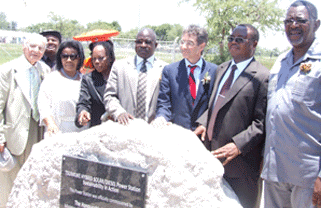NEWS: ACP-EU power project brings electricity to Namibian rural community
 TSUMKWE, Namibia, 31 January 2012/ New Era – NamPower on Wednesday unveiled the much-awaited N$26-million solar-diesel hybrid electricity supplier at Tsumkwe, funded by the ACP-EU Energy Facility. Namibia’s largest off-grid plant will now be able to provide power to the inhabitants of the rural outpost that has a population of less than a thousand people.
TSUMKWE, Namibia, 31 January 2012/ New Era – NamPower on Wednesday unveiled the much-awaited N$26-million solar-diesel hybrid electricity supplier at Tsumkwe, funded by the ACP-EU Energy Facility. Namibia’s largest off-grid plant will now be able to provide power to the inhabitants of the rural outpost that has a population of less than a thousand people.
European partners have availed €2.3 million for the project, which aims to facilitate access to modern energy services for the poor in rural and peri-urban areas in Africa, Carribean and Pacific (ACP) countries. Other sponsors included Nampower, the Desert Research Foundation of Namibia (DRFN). The Ministry of Regional and Local Government, Housing and Rural Development, through the Otjozundjupa Regional Council, also provided financial assistance to electrify Tsumkwe.
Unlike in the past when Tsumkwe residents only had access to electricity for 14 hours per day, the solar-hybrid electricity supplier will now be able to tremendously boost the rural outpost’s power supply.
The first off-grid public power supply in the country, the new plant is one of its kind in Namibia and one of the largest state-of-the-art 200-kilowatt solar/diesel hybrid systems in Africa.
Since the closest grid electricity access point is 180 kilometres away, the settlement had to make use of diesel generators to produce much-needed electricity to the sleepy settlement, whose most popular inhabitant was the late N!xau, the movie star of the movie: ‘The Gods Must Be Crazy’.
For years, Tsumkwe relied on two diesel-powered generators that were maintained and operated by the Ministry of Regional and Local Government, Housing and Rural Development.
Due to the cost of diesel, the supply of electricity at the settlement was restricted to 14 hours per day.
The Minister of Mines and Energy (MME), Isak Katali, lauded the trio for taking the initiative and for having successfully inaugurated the solar/diesel hybrid plant.
He urged the trio to consider replicating the project to the rest of the country, particularly to remote villages that are situated far from the national power grid.
The Ministry of Mines and Energy has availed N$100 million for rural electrification during the current financial year.
Although regional electricity distributors complain of a lack of financing, Katali noted they only complain but they do not apply for funding from the National Energy Fund (NEF).
He urged Namibians to use electricity sparingly because the regional power supply situation has been critical since 2008.
A net importer of 50% of its electricity, Katali said Namibia will always be directly affected by electricity shortage until the country develops its own base load power station by 2015/2016.
During this winter, there will be an 80 megawatt electricity shortage warned Katali, adding that a shortage of 300 megawatt is forecast by 2015. Katali said the Ruacana Hydropower Station will soon be boosted with the installation of an additional 92 megawatt unit generator, which will bring the total production of the hydropower station to 341 megawatts.
Projects currently in the ministry’s pipeline include the Kudu, Erongo Coal, Baynes, Orange River hydro, biomass, wind and solar projects that are all at feasibility study phase.
According to Regional and Local Government, Housing and Rural Development Deputy Minister, Priscilla Beukes, the establishment of Tsumkwe as a settlement was a necessity in order to avail public services and create business opportunities in the area. “We live in a society with an overly skewed economy, characterised by one group of the population living in abundance and the majority of citizens marginalised and finding themselves below the standard of living,” said Beukes.
European Union Ambassador, Raul Fuentes Milani, said Namibia’s energy sector faces an enormous challenge, a situation reflected by the high dependence on imported electricity.
“Energy is one of the pillars of economic development and a lack of access to reliable supply of electricity constitutes a development constraint, especially to people residing in remote and isolated areas such as Tsumkwe,” said Milani.
“The provision of the solar power plant brings much relief to the population of Tsumkwe. The business sector can now provide services to the community with a competitive advantage while the playing field has been levelled for SME’s to play their role in contributing to the overall national economy,” she said.
– NE
